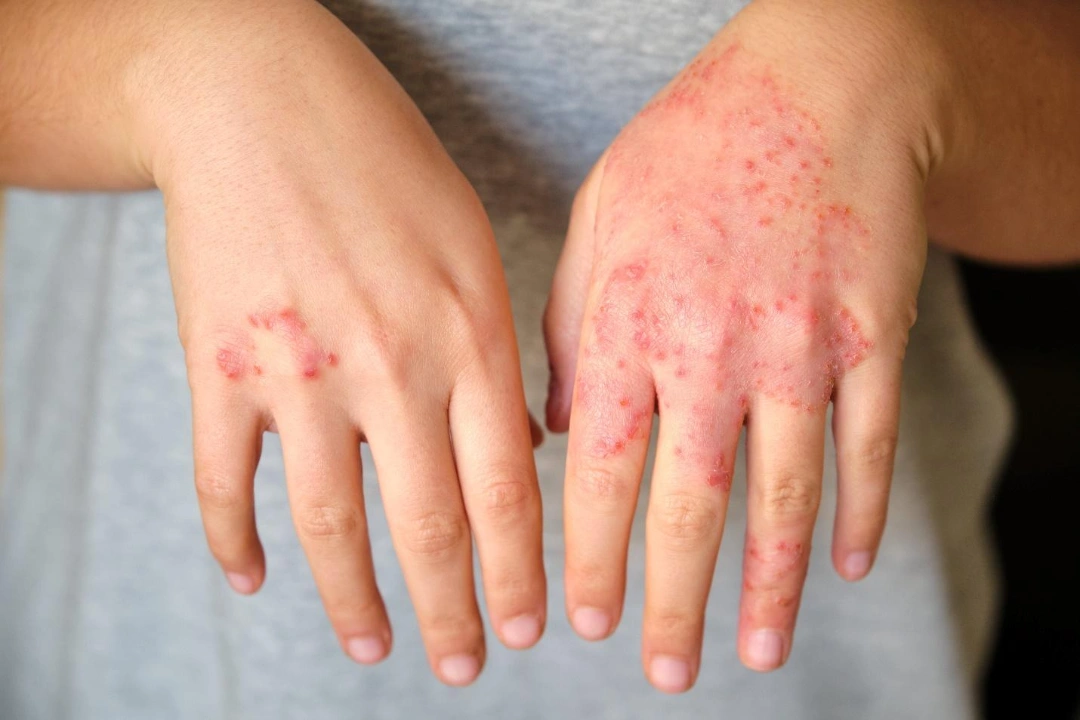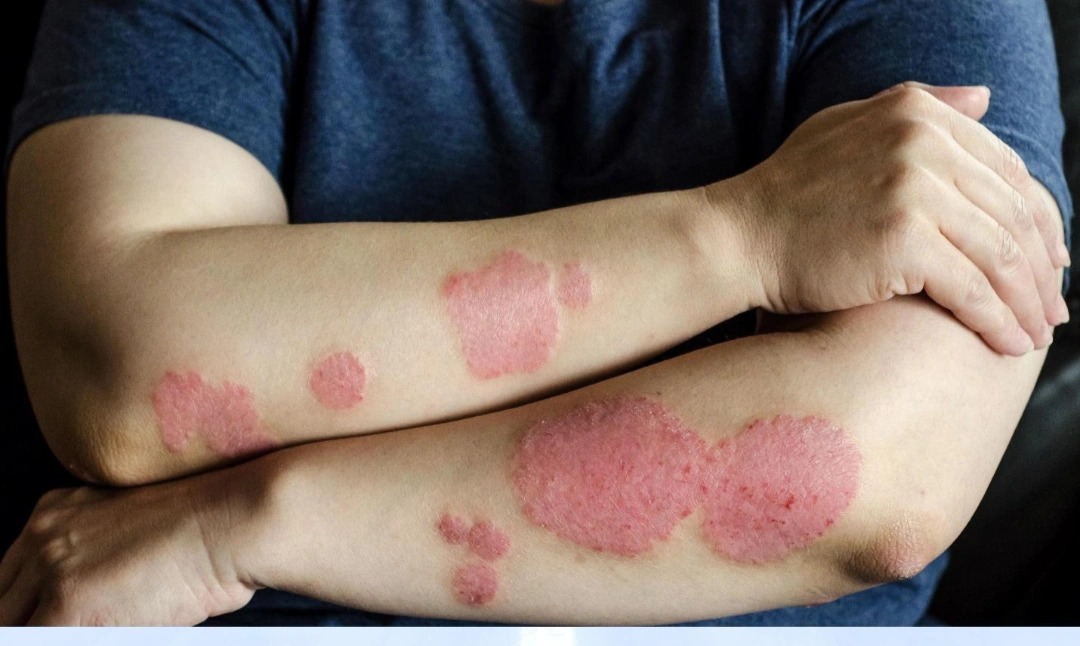
Eczema, also known as dermatitis, is a common yet complex skin condition that affects both children and adults in Singapore. It causes the skin to become inflamed, itchy and dry, with symptoms that may appear suddenly, fade away and then return. Unlike a one-time rash, eczema often has an ongoing course, with periods of flare-ups and calmer spells.
The condition is not contagious. You cannot “catch” it from someone else, but it can deeply affect sleep, self-confidence and even emotional well-being if it is left unmanaged.

Eczema has a few hallmark signs that distinguish it from other rashes. This includes:
Rather than a single condition, eczema is an umbrella term for several related disorders, such as:
| TYPES | FEATURES |
| Atopic Dermatitis |
|
| Contact Dermatitis |
|
| Nummular Eczema (Discoid Eczema) |
|
| Seborrhoeic Dermatitis |
|
| Dyshidrotic Eczema |
|
| Stasis Dermatitis |
|
Eczema does not affect the skin randomly. It tends to favour certain areas of the body, depending on age:
The causes arise from a combination of factors, which include but are not limited to:
| CAUSES | MECHANISM |
| Skin Barrier Breakdown |
|
| Immune System Overreaction |
|
| Microbial Imbalance |
|
Even after eczema has developed, certain everyday factors can spark flare-ups or make symptoms worse. These are not the root causes but external sparks that aggravate sensitive skin.
The potential triggers include:
Environmental triggers
Irritant triggers
Will I need more than one session?
It depends on the condition and its severity. A single session may be enough for smaller acne lesions, but conditions such as keloids, hypertrophic scars or alopecia areata often require several injections spaced four to six weeks apart.
Infection-related triggers
Psychological triggers
Although eczema is a common skin condition, certain groups of people are more susceptible to developing it. Some of them are:

Because eczema can look and feel different from person to person, a careful diagnostic process is essential. At Livingstone Dermatology, we use a step-by-step approach to identify the type, severity and underlying factors contributing to your eczema. That way, the treatment can be precisely tailored to your needs.
Some of the key steps include:
The treatment for eczema is aimed at reducing symptoms, promoting skin healing, preventing flares and restoring comfort. We follow a step-up approach, typically starting with gentler measures when possible and increasing treatment intensity if needed.
At Livingstone Dermatology, our dermatologist often designs based on the severity of the condition, such as:
| LEVEL OF SEVERITY | WHAT WE USUALLY DO |
|---|---|
| Mild or intermittent eczema |
|
| Moderate or frequent flare-ups |
|
| Severe or resistant eczema |
|
Living with eczema can feel overwhelming, but there is always hope. With the right care, understanding of your skin and a supportive treatment plan, most people can achieve significant relief, fewer flare-ups and much more comfortable skin.
At Livingstone Dermatology, we are committed to partnering with you. Our dermatologists attentively listen to your concerns, adjust treatment along the way and help you rediscover confidence in your skin. Healing may take time, but every small improvement is a step forward.
If you have been suffering from eczema, do not delay treatment any longer. Book a consultation and gain access to a personalised treatment plan to improve your overall skin health.
Is eczema contagious?
No, eczema cannot be spread from person to person. It is an inflammatory skin condition caused by a sensitive immune system and skin barrier weakness, not an infection.
What is the best cream for eczema in Singapore?
The best cream depends on your skin type and severity. For most people, fragrance-free moisturisers are essential, while medicated creams such as corticosteroids or calcineurin inhibitors may be prescribed during flare-ups. Our dermatologist can help recommend the safest and most effective option for your skin.
Can eczema be cured permanently?
There is no permanent cure yet, but eczema can be well-controlled with the right treatment and lifestyle adjustments. Many people experience long periods of clear skin with proper care. Children may even outgrow the condition as they get older.
What foods trigger eczema?
Food is not the root cause of eczema, but in some people, certain foods may worsen symptoms. Common culprits include eggs, cow’s milk, soy, peanuts and shellfish. If a food allergy is suspected, our dermatologists often recommend proper allergy testing before making dietary changes.
How can I stop eczema itching at night?
Moisturising before bed, keeping the room cool and wearing soft cotton sleepwear may help reduce night-time itching. Using your prescribed anti-inflammatory cream before sleep can also keep flares under control. For persistent problems, speak with our dermatologist for tailored options.
Can stress make eczema worse?
Yes, stress is a common trigger that can intensify the itch-scratch cycle. Managing stress with exercise, relaxation techniques or counselling can complement medical treatment.
Is it safe to use steroid creams for eczema long-term?
When used correctly under medical guidance, steroid creams are safe and effective. Dermatologists prescribe the right strength and duration to minimise side effects and often combine them with moisturisers or non-steroid alternatives for maintenance.
Are there natural remedies for eczema?
Natural remedies such as oatmeal baths, coconut oil or aloe vera may soothe some symptoms, but they are not a substitute for medical treatment. It is best to discuss these options with our dermatologist before trying them.
How do I treat eczema on my face?
Facial skin is delicate, so treatment usually avoids strong steroids. Instead, gentle moisturisers and non-steroid anti-inflammatory creams like calcineurin inhibitors are commonly prescribed.
What is the difference between eczema and psoriasis?
Both cause red, itchy skin, but they are different conditions. Eczema is linked to a weak skin barrier and allergy-prone immune response, while psoriasis is an autoimmune condition that speeds up skin cell turnover. Our dermatologist can distinguish between the two during consultation.
Can children and babies with eczema be treated safely?
Yes, many treatments are safe and effective for children, including moisturisers, mild steroid creams and non-steroid options. Our dermatologists always adjust treatment according to age, skin sensitivity and comfort.
What is the latest treatment for severe eczema in Singapore?
Newer therapies such as biologics (such as dupilumab) and JAK inhibitors are available in Singapore for patients with moderate-to-severe eczema who do not respond well to traditional treatment. These targeted medicines can greatly improve the quality of life under specialist care.
Whether you’re dealing with a specific skin concern or seeking to enhance your natural beauty, Livingstone Dermatology is here to guide you on your journey to healthy, radiant skin.
Schedule an appointment today and experience the Livingstone standard of care in a welcoming, professional environment.